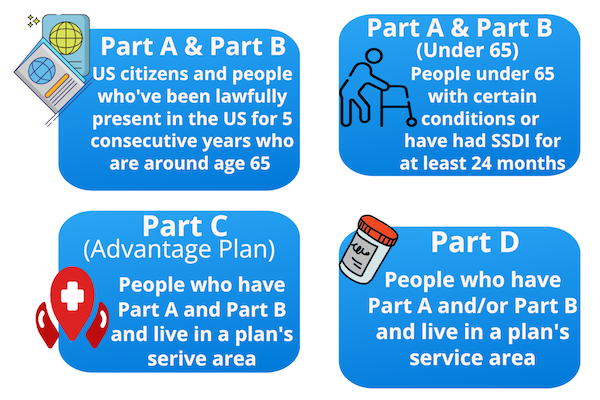Medicare Eligibility
Part A|Part B|Part C|Part D|FAQs|Find Out More
KEY POINTS
- Your Medicare eligibility does not depend on your Full Retirement Age or Social Security eligibility.
- Most people become eligible and sign up for Medicare around age 65 during their 7-month Initial Enrollment Period.
- Only people receiving SSDI benefits or who have certain health conditions can qualify for Medicare under age 65.
Who is eligible for Medicare anyway? And when can you get Medicare? Medicare eligibility begins for most people at age 65. Individuals who have been entitled to Social Security disability for at least 24 months also qualify.
Many people confuse their Medicare Eligibility date with their Social Security retirement age. They are different. A person can apply for full retirement income benefits at around age 67. This is considered their retirement age. However, this does not affect the age at which they qualify for Medicare.
There is no such thing as a Medicare retirement age. The normal Medicare eligibility age for Medicare is age 65, whether you have retired or not. You can qualify for Medicare coverage at age 65 (or older) if you are a U.S. citizen or a permanent resident and you’ve lived here continuously for 5 years or more.
Medicare Eligibility
Here is a quick overview of who is eligible for Medicare and Medicare Plans

You can also qualify for Medicare under these circumstances when you are under the age of 65:
- if you are permanently disabled and you have been receiving Social Security disability income benefits for 24 months.
- when you have end-stage renal disease, which is kidney failure that requires you to get dialysis or you are waiting for a kidney transplant
- if you have Amyotrophic Lateral Sclerosis (ALS), also called Lou Gehrig’s disease
Read on for further Medicare eligibility details:
Eligibility for Medicare Part A
You are eligible for Medicare Part A at age 65 if you or your spouse has legally worked for at least 10 years in the U.S.
During those years, you paid taxes toward your Part A hospital benefits. This is why most Americans pay no Part A premiums when they become eligible for Medicare. Part A mainly covers your hospital stays.
If you have not worked the required 10 years to qualify for Medicare Part A at no cost, you can purchase Part A. Contact Social Security to find out the cost.
If you must purchase Part A, the coverage will cost $505/month. In some cases, however, there are partial premiums for people who have worked over 30 but less than 40 quarters.
You may be automatically enrolled in Part A (and Part B) at the time you turn 65 if you have already enrolled in Social Security income benefits. Your Medicare card will usually arrive in your mailbox about 4 – 6 weeks before you turn 65.
Eligibility for Medicare Part B
You are eligible for Medicare Part B at age 65 as well. However, you must pay a monthly premium for Part B. This provides for your outpatient benefits such as doctor visits, lab work, surgery fees, and more. Check out our Part B page for more on what Part B covers.
Some people turning 65 still have health insurance through an employer. They can delay their enrollment into Part B in favor of their group health insurance without fearing a late penalty.
If you delay enrollment into Part B, consult with an insurance agent who specializes in Medicare. He or she can explain the special election periods that you must use later on so that you won’t be subject to a late enrollment penalty.
When can I first Enroll in Medicare?

Eligibility for Medicare Part C
Medicare Part C is another name for the Medicare Advantage program. You can enroll in Part C if you wish to get your benefits through a private insurance company instead of Original Medicare. Usually, these plans have smaller networks than Medicare, but some of them include built-in Part D coverage.
To be eligible for Part C, you must first be enrolled in both Medicare Parts A and B. You must also live in the plan’s service area.
Many people think that if they enroll in a Medicare Advantage plan, they can drop their Part B and escape paying Part B premiums. This is NOT the case. You must have both A and B to even be eligible to enroll in either a Medicare Advantage plan or Medigap plan. You must continue to be enrolled in Parts A and B during the entire time that you are enrolled in a Medicare Advantage plan.
Learn more about Part C Advantage plans here.
Eligibility for Medicare Part D
You are eligible for Medicare Part D as long as you are actively enrolled in either Part A and/or B. You must also live in the Part D plans’ service area. Though Medicare Part D is voluntary, we strongly recommend it if you have no other drug coverage. Part D provides your insurance against future catastrophic medication costs. It will also help give you lower copays on medications you take now.
Be aware that if you do not enroll in Part D and you have no other creditable coverage, you may incur late penalties when you enroll later on.
Frequently Asked Questions
Who is eligible for Medicare Under 65?
When you are under 65, you become eligible for Medicare if:
- You have received Social Security Disability Insurance (SSDI) checks for at least 24 months
- Or, you have been diagnosed with End-Stage Renal Disease (ESRD)
Eligibility for Medicare due to a disability
You may qualify for Medicare due to a disability if you have been receiving SSDI checks for more than 24 months, also known as the two-year waiting period. The two-year waiting period begins the first month you receive an SSDI check. You will be automatically enrolled in Medicare at the beginning of the 25th month that you receive an SSDI check.
If you receive SSDI because you have Amyotrophic Lateral Sclerosis, or ALS, Medicare automatically begins the first month that your SSDI benefits start. You do not have the two-year waiting period.
Social Security—not Medicare—makes the determination of whether you qualify for SSDI checks and administers the program that provides the checks. For more information on the Social Security Disability Insurance program, it is recommended that you contact your local Social Security Administration (SSA) office.
Note: Railroad workers should contact the Railroad Retirement Board for information about disability annuity and Medicare eligibility.
Eligibility for ESDR Medicare
You may qualify for ESRD Medicare if you have been diagnosed with kidney failure and you:
- Are getting dialysis treatments or have had a kidney transplant
- And:
- You are eligible to receive SSDI
- You are eligible to receive Railroad Retirement benefits
- Or, you, a spouse, or a parent have paid Medicare taxes for a sufficient amount of time as specified by the Social Security Administration
If you are under 65 and have ESRD, when your Medicare benefits begin depends on your specific circumstances , including when you apply for Medicare, whether you receive dialysis at home or at a facility, and whether you get a kidney transplant. If you are eligible for ESRD Medicare, you can enroll in Parts A and B together at any time. Part A will be retroactive up to 12 months, but it cannot start earlier than the first month you were eligible for ESRD Medicare.
Note: If you are a railroad worker with ESRD, you must contact Social Security—not the Railroad Retirement Board —to find out if you are eligible for Medicare.
Because Social Security and Medicare eligibility rules are complex, it is recommended that you call Social Security at 800-772-1213 to get the most accurate information regarding your particular situation.
In order to understand Medicare Eligibility it is Important to Understand Your Different Enrollment Periods. See the Video below from Medicare Interactive

Your work history does not determine Medicare Eligibility, but it cab affect your Medicare Part A Costs
Is everyone eligible for Medicare?
No. You must be a U.S. Citizen or a permanent resident who has lived continuously in the United States for at least 5 years.
When do I qualify for Medicare?
If you are aging into Medicare, you will qualify at age 65. This is regardless of when you apply for Social Security income benefits.
Can a person get Medicare at age 62?
Not unless they qualify under one of the circumstances discussed in the previous question. Your Medicare eligibility date is not the same as your Social Security eligibility date.
At what age can you apply for Medicare?
You can apply when you are age 64, as early as 3 months before your 65th birthday month.
How long do you have to work to be eligible for Medicare?
Your eligibility for Medicare is not based on your work history. However, people with at least 10 years (40 quarters) of paying Medicare payroll taxes will get Part A services without paying premiums once they are eligible.
Is it mandatory to sign up for Medicare at age 65?
No, but if you do not have other creditable health coverage, you will face penalties for delaying your Medicare enrollment. You should also know that when you enroll in Social Security income benefits, you will be automatically enrolled in Medicare Part A. You cannot have one without the other.
Who is eligible for Medicare and Medicaid?
Medicare is our national health insurance system for people aged 65 and older and people with certain disabilities. Medicaid is a joint federal and state program to provide benefits for people with low incomes. It is possible to qualify for both Medicare and Medicaid. In this scenario, Medicare is primary, and Medicaid is secondary.
Can I get Medicare even if I never worked?
Yes, as long as you are a U.S. citizen or permanent resident for at least 5 consecutive years, you are eligible for Medicare. However, if you never worked in the U.S., Medicare will be more expensive because you will pay the Medicare Part A premium. You can qualify for premium-free Part A if your spouse has a work record of 10 years or more.
Key Takeaways
- If you have other creditable coverage, such as large employer insurance, you can delay Medicare past 65.
- There are late enrollment penalties if you do not sign up for Medicare when you are first eligible and do not have other creditable coverage.
- If you’re still unsure of when to sign up for Medicare, give our team a call at 843-227-6725 for free assistance.
Find out about your Medicare Eligibility
Determining your Medicare eligibility is sometimes difficult. We get many questions about when you can collect Medicare, how to qualify for Medicare, what the Medicare requirements are, when to enroll in Medicare, and how to set up Medicare supplement insurance. Though the process may seem overwhelming to you, our experts deal with these processes every day. We can guide you easily through the process before you reach Medicare age.
You are not alone – let a May River Medicare licensed agent assist you in making this entire process easier.
Call (843) 227-6725 or click below to request a free consultation!
Medicare Explained: A Deep Dive into Enrollment Periods
